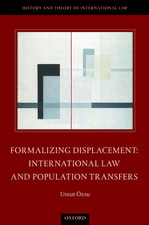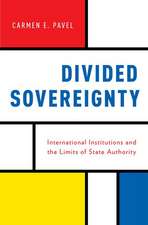Reciprocity in International Law: Its impact and function: Routledge Research in International Law
Autor Shahrad Nasrolahi Farden Limba Engleză Paperback – iun 2018
| Toate formatele și edițiile | Preț | Express |
|---|---|---|
| Paperback (1) | 409.48 lei 6-8 săpt. | |
| Taylor & Francis – iun 2018 | 409.48 lei 6-8 săpt. | |
| Hardback (1) | 1054.58 lei 6-8 săpt. | |
| Taylor & Francis – 17 dec 2015 | 1054.58 lei 6-8 săpt. |
Din seria Routledge Research in International Law
-
 Preț: 296.42 lei
Preț: 296.42 lei -
 Preț: 311.70 lei
Preț: 311.70 lei -
 Preț: 151.71 lei
Preț: 151.71 lei -
 Preț: 311.94 lei
Preț: 311.94 lei -
 Preț: 281.27 lei
Preț: 281.27 lei - 18%
 Preț: 1053.16 lei
Preț: 1053.16 lei -
 Preț: 484.47 lei
Preț: 484.47 lei -
 Preț: 282.62 lei
Preț: 282.62 lei -
 Preț: 410.46 lei
Preț: 410.46 lei - 18%
 Preț: 1060.52 lei
Preț: 1060.52 lei - 18%
 Preț: 1058.43 lei
Preț: 1058.43 lei -
 Preț: 452.27 lei
Preț: 452.27 lei - 18%
 Preț: 1054.75 lei
Preț: 1054.75 lei - 18%
 Preț: 727.38 lei
Preț: 727.38 lei -
 Preț: 422.04 lei
Preț: 422.04 lei - 18%
 Preț: 1054.71 lei
Preț: 1054.71 lei - 18%
 Preț: 1059.48 lei
Preț: 1059.48 lei - 18%
 Preț: 1074.44 lei
Preț: 1074.44 lei -
 Preț: 451.41 lei
Preț: 451.41 lei -
 Preț: 419.11 lei
Preț: 419.11 lei - 28%
 Preț: 822.34 lei
Preț: 822.34 lei -
 Preț: 494.07 lei
Preț: 494.07 lei - 18%
 Preț: 1117.88 lei
Preț: 1117.88 lei - 18%
 Preț: 1118.46 lei
Preț: 1118.46 lei -
 Preț: 491.60 lei
Preț: 491.60 lei -
 Preț: 490.25 lei
Preț: 490.25 lei - 18%
 Preț: 1178.15 lei
Preț: 1178.15 lei -
 Preț: 444.62 lei
Preț: 444.62 lei - 18%
 Preț: 1050.78 lei
Preț: 1050.78 lei -
 Preț: 454.22 lei
Preț: 454.22 lei - 14%
 Preț: 301.05 lei
Preț: 301.05 lei -
 Preț: 419.32 lei
Preț: 419.32 lei - 18%
 Preț: 1052.38 lei
Preț: 1052.38 lei - 18%
 Preț: 1111.87 lei
Preț: 1111.87 lei - 18%
 Preț: 1112.34 lei
Preț: 1112.34 lei - 15%
 Preț: 550.99 lei
Preț: 550.99 lei - 18%
 Preț: 1054.71 lei
Preț: 1054.71 lei -
 Preț: 422.91 lei
Preț: 422.91 lei -
 Preț: 286.51 lei
Preț: 286.51 lei - 18%
 Preț: 1065.06 lei
Preț: 1065.06 lei
Preț: 409.48 lei
Nou
Puncte Express: 614
Preț estimativ în valută:
78.35€ • 81.81$ • 64.85£
78.35€ • 81.81$ • 64.85£
Carte tipărită la comandă
Livrare economică 04-18 aprilie
Preluare comenzi: 021 569.72.76
Specificații
ISBN-13: 9781138614543
ISBN-10: 1138614548
Pagini: 194
Dimensiuni: 156 x 234 x 11 mm
Greutate: 0.29 kg
Ediția:1
Editura: Taylor & Francis
Colecția Routledge
Seria Routledge Research in International Law
Locul publicării:Oxford, United Kingdom
ISBN-10: 1138614548
Pagini: 194
Dimensiuni: 156 x 234 x 11 mm
Greutate: 0.29 kg
Ediția:1
Editura: Taylor & Francis
Colecția Routledge
Seria Routledge Research in International Law
Locul publicării:Oxford, United Kingdom
Public țintă
Postgraduate and UndergraduateCuprins
1. Introduction 2.What is Reciprocity? 3. Reciprocity and the Sources of International Law 4. Reciprocity and the Rule of Law 5. Reciprocity and Enforcement Mechanisms of International Law 6. Reciprocity and International Cooperation 7. Final Remarks
Descriere
In international relations, reciprocity describes an environment in which States support one another for short- or long-term advantage through the balancing of rights, duties and interests. This book examines reciprocity in the context of international law. It considers the role reciprocity plays in the creation and development of international law as well as in the interpretation and application of international law. The book examines how reciprocity is intertwined with the principle of equality, and the beneficial effects of reciprocity in creating stability and cooperation amongst States.

















